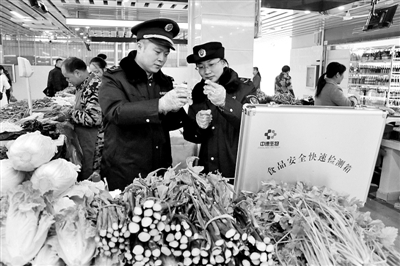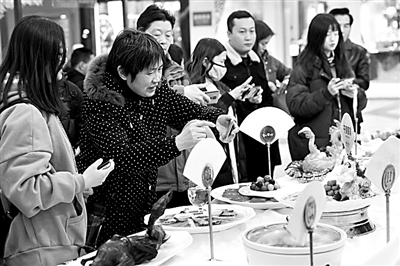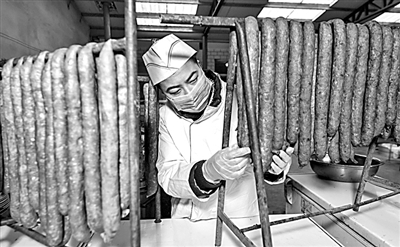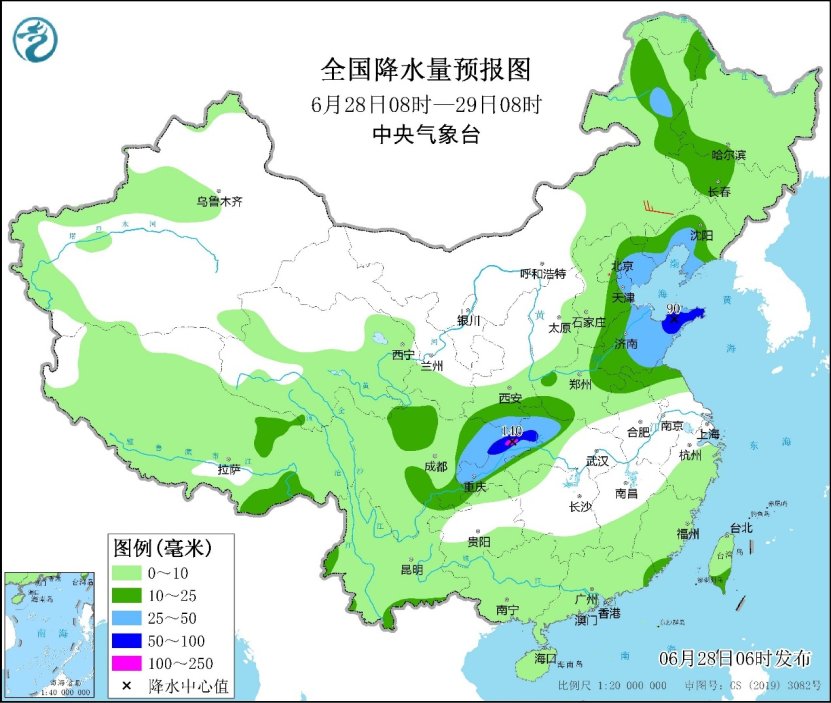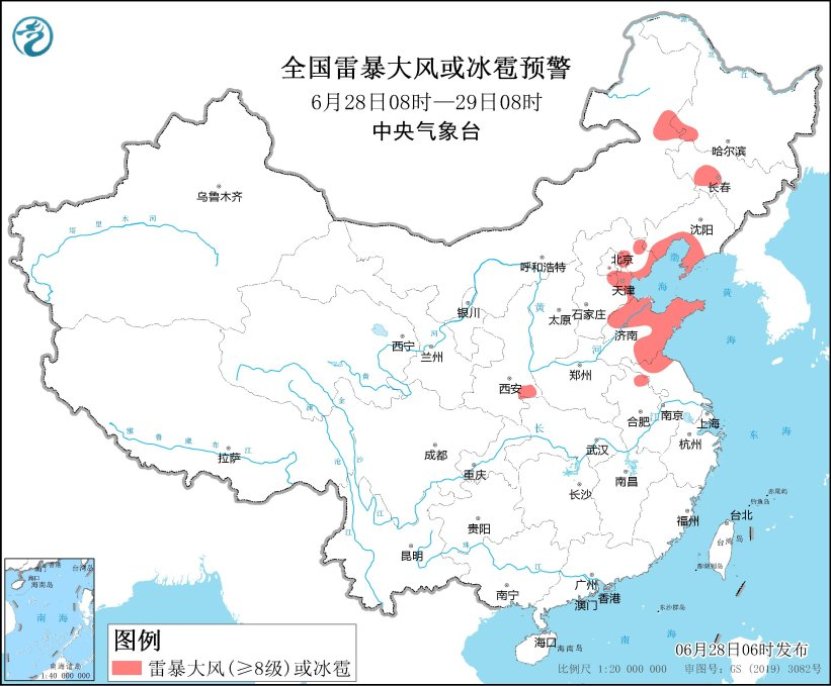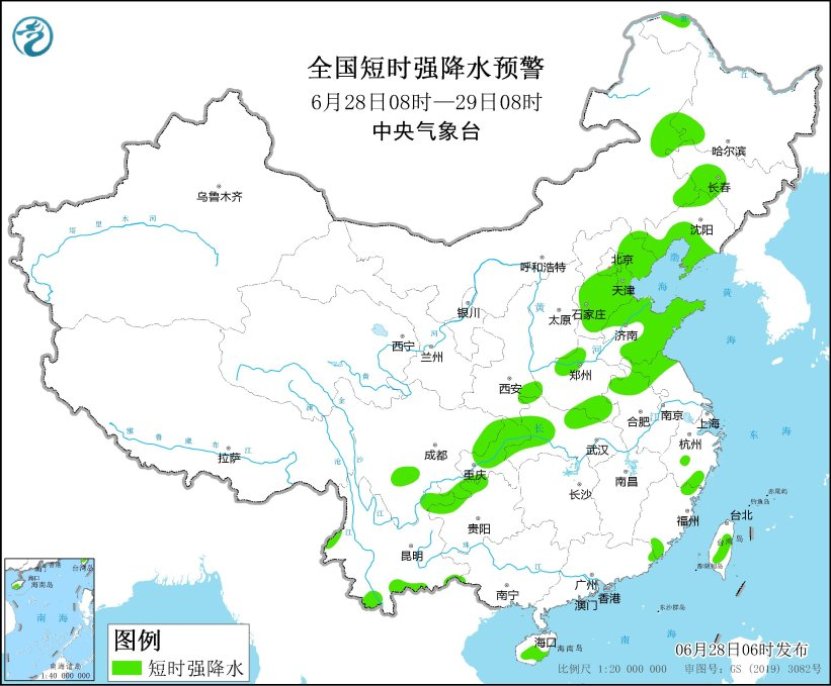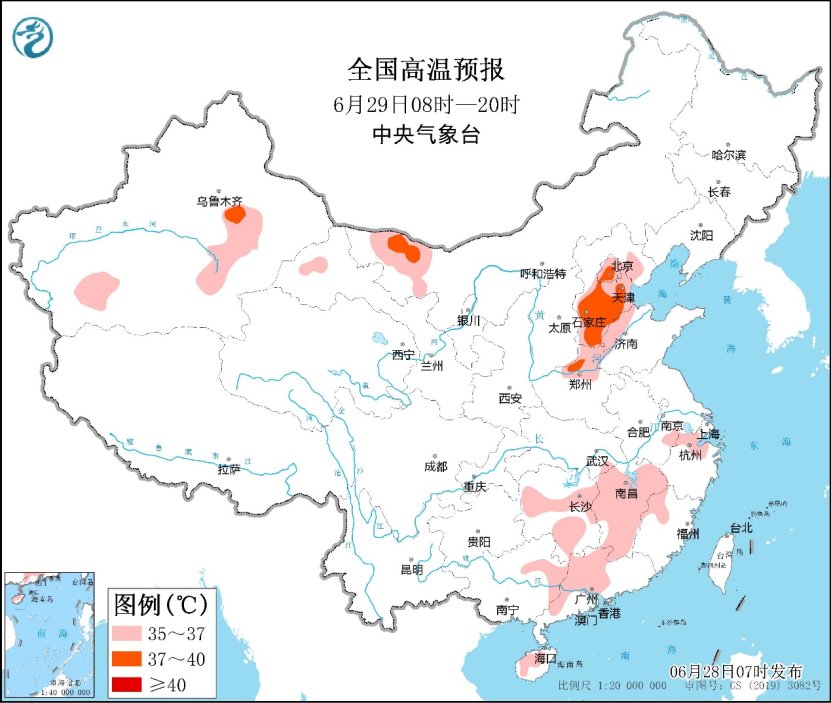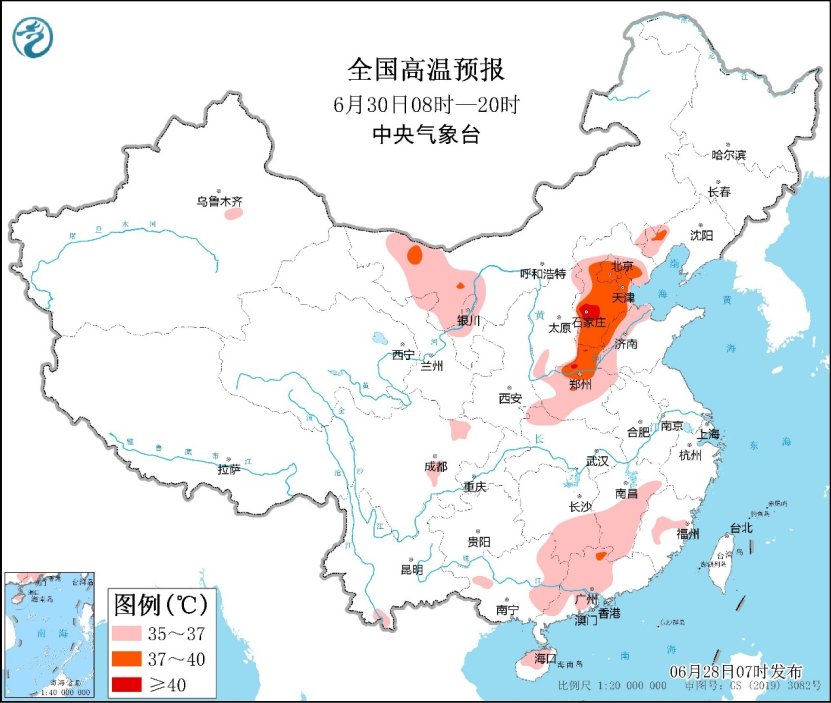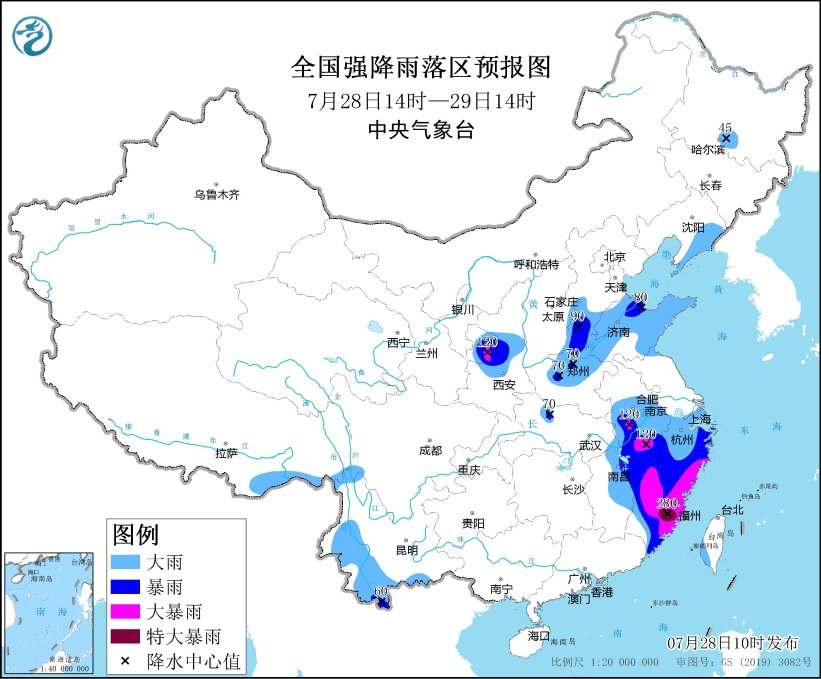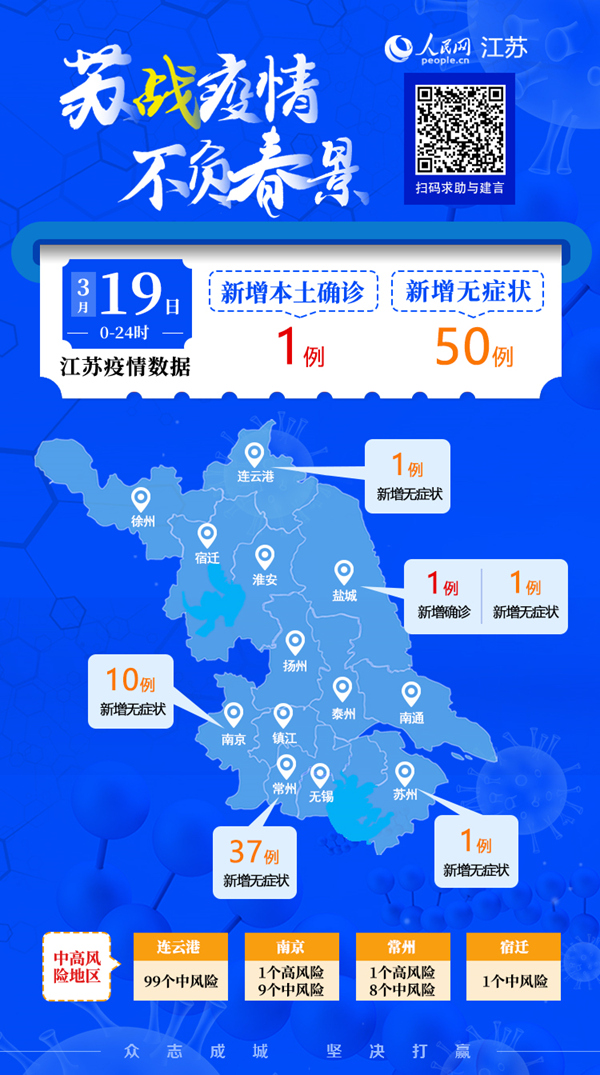
On March 19th, a total of 1 local confirmed case and 50 asymptomatic infected people were added in Jiangsu province, involving Lianyungang, Nanjing, Suzhou, Changzhou and Yancheng. In the early morning of March 20th, Nanjing reported that four positive people had been treated in the hospital of integrated traditional Chinese and western medicine in the city, and now they are urgently looking for close contacts.
Local addition
From 00: 00 to 24: 00 on the 19th
One new case was diagnosed locally in Jiangsu, and 50 cases were asymptomatic:
Yancheng: 1 new case was diagnosed and 1 asymptomatic (1 case was diagnosed from asymptomatic, and 1 case was found in centralized isolation, which was the first asymptomatic driver in the same car).
Nanjing: 10 new cases were asymptomatic (found in closed control area, control area and fever clinic)
Lianyungang: added 1 asymptomatic (involving Haizhou District, which was found in centralized isolation)
Suzhou: One new asymptomatic case (found by screening at centralized isolation point, it is a person who returned to Suzhou from other provinces and cities).
Changzhou: 37 new asymptomatic cases (found in isolation points, sealed control areas and control areas, involving Wujin District, Xinbei District, Tianning District, Zhonglou District and Changzhou Economic Development Zone)
Risk area
Lianyungang: 99 medium-risk areas (involving Haizhou District, Lianyun District, Guanyun District and Development Zone)
Nanjing: 1 high-risk area (East Garden of Yaju, West Lake, Dongshan Street, Jiangning District) and 9 medium-risk areas (5 in Jiangning District, 3 in Qinhuai District and 1 in Qixia District).
Changzhou: 1 high-risk area (Qingyun Lanwan project site in Zhonglou District, Changzhou City) and 8 medium-risk areas (2 in Xinbei District, 2 in Tianning District and 4 in Wujin District).
Suqian: 1 medium-risk area (Group 10, Qinci Village, Longhe Town, Sucheng District)
Prevention and control measures
10:00 on 19th-10: 00 on 20th
National Health Commission: Omicron mutant COVID-19 vaccine has made positive progress.
On the afternoon of March 19th, the State Council Joint Prevention and Control Mechanism held a press conference to introduce the situation of epidemic prevention and control work strictly, scientifically and accurately. Up to now, positive progress has been made in the research and development of univalent and multivalent vaccines for Omicron mutant strains, and the preclinical research has been completed with relatively rapid progress, and the application materials for clinical trials are being submitted to the State Drug Administration.
Jiangsu promotes the full coverage of medical insurance service "not meeting"
Jiangsu medical insurance department promotes all medical insurance public service matters "online, handheld", realizes full coverage of "no meeting", and ensures that insured persons, insured units, designated medical institutions and other clients can handle medical insurance business without leaving home, and comprehensively helps normalize epidemic prevention and control.
Nanjing: Answering questions such as regional large-scale nucleic acid detection and special medical treatment in middle and high-risk areas of Jiangning.
In order to cut off the virus transmission chain as soon as possible, control the epidemic situation as quickly as possible, and restore the normal production and living order of citizens as soon as possible, it is necessary to carry out large-scale nucleic acid testing to thoroughly investigate the potential population infected in the city.
On the 19th, Miao Xiumei, member of the Standing Committee of Nanjing Jiangning District Committee and executive deputy head of the district, responded that at present, 51 special groups including uremia, pregnant women, radiotherapy and chemotherapy have medical needs; To co-ordinate medical forces, Jiangning Chinese Medicine Hospital (Grade III Hospital) has been designated as the centralized medical treatment center in the whole district to provide comprehensive medical assistance services for centralized control personnel and yellow code personnel. After emergency renovation, the hospital was officially admitted yesterday morning.
The second round of nucleic acid detection was carried out in Jiangbei New District and Yuhuatai, Nanjing, looking for positive close connection in Nanjing Hospital of Integrated Traditional Chinese and Western Medicine.
On the 19th, Jiangbei New District of Nanjing issued a notice, starting from 9:00 on March 20th, the second round of large-scale nucleic acid detection was carried out in Taishan Street, Yanjiang Street and Pancheng Street. On March 20th, from 7:30 to 23:00, Yuhuatai District of Nanjing carried out the second round of nucleic acid screening for residents in all streets.
According to the latest epidemiological investigation, four cases of positive infected people have been in and out of the clinic of Nanjing Hospital of Integrated Traditional Chinese and Western Medicine (No.179 Xiaolingwei, Xuanwu District). Please stay here from 9: 00 to 11: 30 on March 14th and from 12: 00 to 16: 30 on March 15th, and report to the local epidemic prevention and control department at the first time. Assign Su Kang code and yellow code to the personnel in the above time period, carry out home health monitoring for 3 days as required, and conduct nucleic acid detection twice at the sampling point dedicated to the yellow code personnel (with an interval of 24 hours).
Nanjing Jiangning temporarily adjusted bus routes, strengthened epidemic prevention and control in residential quarters, and further strengthened epidemic prevention measures in Zhongcai market.
From now on, Jiangning Bus Group will temporarily adjust some bus lines and suspend the operation of 800 bus lines; 822 Road and 831 Road: Wanfu Road, Runfa Road Middle and Cunxigang will not stop for the time being; No.850 Road: 8 stations of Shangfang Safe Housing Terminal, Wanfu Road, Wanfu Road Yijing Street, Wanfu Road Dongqi Road, Dalishudong, Dalishuxi, Hongyunfang and Fengze Road will not stop temporarily.
On the 19th, Jiangning District, Nanjing issued a notice, stating that in principle, there is one gate in and out of residential quarters (two gates can be used in large-scale quarters of over 300,000 square meters); In principle, only one entrance and exit is reserved in the natural village (two entrances and exits can be set compared with the natural village), and all other entrances and exits must be physically separated, so that they should be separated. The construction site is under closed management. In principle, only one entrance and exit is reserved in each independent area. From now on, no new staff will be arranged on the construction site in principle.
Since 0: 00 on March 20th, Nanjing Zhongcai Market has kept the vegetable market, fruit market, aquatic product market and grain and oil market operating normally, while the non-staple food market has kept a small number of shops for supplying materials, while the rest markets have been temporarily closed, prohibiting all business merchants from retailing.
Suzhou: Xiangcheng carries out regional nucleic acid detection.
On March 20th, Xiangcheng District, Suzhou launched a regional nucleic acid test, in which all residents participated. If residents are absent from work due to their participation in regional nucleic acid testing, the employer will not handle their absence.
Wuxi: authoritative answers to hot issues such as travel cassette *
At present, there is no medium-high risk area in Wuxi, and Wuxi travel card does not carry *. The determination of medium and high risk areas needs to be based on the prevention and control of risks according to the epidemic situation, and it is determined by provincial and municipal experts. Jiangyin and Yixing citizens can come to Wuxi urban area, and there is no need to implement "3+11" health management measures.
Xuzhou: Announcement of Precautions for Nucleic Acid Detection
On the evening of the 19th, Xuzhou issued a reminder not to take part in nucleic acid sampling within 48 hours after COVID-19 vaccination; Try to avoid eating 2 hours before nucleic acid detection to avoid vomiting; Do not smoke, drink or chew gum for 30 minutes before sampling.
Changzhou: Pediatric departments and emergency departments of medical and health institutions in the city opened normally, and the subway operation was further adjusted.
On the 19th, Changzhou issued a reminder that at present, the outpatient and emergency services of all medical and health institutions in the city (except the outpatient and emergency services of the Second People’s Hospital of Changzhou City and the outpatient and emergency services of Changzhou Children’s Hospital) are carried out normally, and the information of six hospitals has been published.
Since March 20th, the first bus time of Changzhou Metro Lines 1 and 2 has been adjusted to 7: 00 and the last bus time to 21: 00. During the full-day operation of Line 1 and Line 2, the running interval is about 60 minutes. Temporarily close Line 1: Xinlong Station, Xinqiao Station, Foreign Language School Station, Hehai Station, Cuizhu Station, Boai Road Station, Qingliangsi Station, Xintiandi Park Station, Science and Education City North Station and Wujin Intercity Station along the Yangtze River; Line 2: Lucheng Station, Dingyan Station, Ziyun Station, Wujiaochang Station, Hongmei Park Station, Huaide Station, Wuxing Station and Haitang Road Station.
Changzhou General Tap Water Customer Service Center suspended its external service and responded to issues such as wages and benefits during the isolation period.
Changzhou General Water Supply Co., Ltd. issued a notice that all outlets of the customer service center would be closed for 2 days from March 20 to March 21. The water fee can be paid through online channels such as Alipay and WeChat, or through WeChat WeChat official account of Changzhou General Water Supply Co., Ltd., and click on "My Water Situation" and "WeChat Web Hall" for self-service business.
On the afternoon of March 19th, Changzhou held a press conference to answer the development and hot issues of the window service of people’s society. For example, for Covid-19 infected patients, suspected patients, close contacts during their isolation treatment or medical observation, and employees who cannot provide normal labor due to government isolation measures, the employer shall treat them as providing normal labor and pay their wages.
Yancheng: Release the medical guide for people who come (return) to salt and "trip cassette *" from other provinces and cities.
All people who come from other provinces and cities to return salt to medical institutions must provide negative nucleic acid certificates within 48 hours. People with "trip cassette *" with ten symptoms in COVID-19 should go to the designated fever clinic, Yancheng Second People’s Hospital is the designated fever clinic in the metropolitan area, and other county (city, district) people’s hospitals are the local designated fever clinics.
Taizhou: Some primary and secondary schools and kindergartens in Taixing resumed classes.
Since March 20th, primary and secondary schools (including secondary vocational schools) and kindergartens in Jichuan Street, Yanling Street and Yaowang Street in Taixing City, Taizhou have resumed offline teaching. Students in the closed control area, control area and home medical observation still teach online. All off-campus training institutions in the city will still suspend offline training activities.
Zhenjiang: Jurong carried out all the nucleic acids in the relevant areas, answered questions about dialysis patients seeking medical treatment, and Baohua Town reminded residents in the control area to participate in nucleic acid testing.
On March 20th (Sunday), from 07:00 to 13:00, jurong city, Zhenjiang carried out the whole staff’s nucleic acid detection in Xiashu Town, Biancheng Town, baitu Town, Guo Zhuang Town (Chishan Lake), Houbai Town, Tianwang Town, Maoshan Town and Maoshan Scenic Area.
On March 19th, jurong city, Zhenjiang answered some hot issues that citizens and netizens were concerned about. For example, if the patient’s participation in the national nucleic acid test was negative, he reported it to the joint prevention and control headquarters of COVID-19 epidemic in Baohua Town. After the audit, the headquarters assigned special classes to dock with medical institutions, and arranged special vehicles to be sent to designated hospitals for treatment after confirmation.
On the evening of 19th, Baohua Town, jurong city, Zhenjiang issued a notice that the personnel in the control area must complete at least three nucleic acid tests before March 21st. Those who fail to complete the project according to the regulations will reduce the social credit rating, and those who cause the spread of the epidemic will be investigated for legal responsibility. Residents who haven’t finished yet are invited to go to China Merchants Plaza, the gate of Fengtan Community, Chunri and the sampling point of audio-visual electronic nucleic acid detection for nucleic acid sampling from 13: 30 pm to 18: 00 pm on March 19.
Lianyungang: Release the requirements for leaving the stranded personnel in Haizhou, and clarify the relevant requirements for leaving the company. The Su Kang code of the uninspected personnel in Haizhou should be given yellow code.
On the 19th, Lianyungang issued a notice to seal off the people stranded in the communities (villages) where the control areas, control areas and confirmed cases (including asymptomatic infected persons) are located, and maintain the existing policies unchanged. The personnel stranded in Xindong Street will maintain the existing policy unchanged. People stranded in other areas must hold a certificate issued by the street (township) that "the person is not in the closed control area, the control area, and the community (village) where the confirmed case (including asymptomatic infected persons) is located", and can leave after being inspected by traffic control points along the way.
On the 20 th, Lianyungang issued a notice, and the personnel in the closed control area and the control area were implemented according to the policy of closed control area and control area; Personnel in Xindong Street, Haizhou District, maintain the existing policy unchanged; People in other areas can be separated in an orderly manner under the condition that the health code is green and personal protection is done.
On the morning of 20th, Lianyungang issued a notice that since March 5th, the Su Kang codes of all the people who did not participate in Covid-19 nucleic acid testing in Haizhou District will be given yellow codes. The personnel assigned with yellow code in Su Kang code must strictly implement the control requirements of yellow code personnel, immediately report to the local community (village) and conduct health monitoring for 3 days. During this period, they will go to the special nucleic acid sampling point for "yellow code" personnel in the city for "three times a day" nucleic acid testing, and all the results are negative, and their Su Kang code will automatically turn into green code.
Suqian: The Education Bureau advocates that primary and secondary school students should take precautions at home and school, and go to school at different peaks. Suyu launched the third round of large-scale nucleic acid testing.
On the evening of 19th, Suqian Education Bureau issued a letter to the parents of primary and secondary school students in the city, proposing to parents to minimize the travel away from home, attach importance to family protection, actively participate in home-school defense, and positively educate and guide children.
All primary and secondary schools and kindergartens in the city go to and from school at staggered peaks according to the actual work situation of the school, and the interval between grades is more than 10 minutes, so as to avoid the crowd gathering caused by parents picking up and dropping off their children at the same time. Primary and secondary schools that provide accommodation should implement the "one-life case" according to the distance between students and their return to school.
On March 20th, from 6: 00am to 12: 00am, Suqian suyu district conducted the third round of large-scale nucleic acid detection for all personnel (including permanent residents, temporary residents and floating personnel) in its jurisdiction.
Epidemic prevention bulletin
Nanjing: Inform about recent epidemic-related cases.
On the 19th, Cao Cunfu, member of the Party Committee of Nanjing Public Security Bureau, informed about the recent epidemic-related cases and announced two typical cases. As of March 18th, the city has investigated and dealt with 41 epidemic-related cases and imposed 42 administrative punishments.
Taizhou: Announcing the Eighth Batch of Typical Cases of "Big Inspection" on Epidemic Prevention and Control
On the 19th, Taizhou announced the eighth batch of typical cases of "major inspection", including Min Moumou’s refusal to cooperate with the inspection of the itinerary card, Liu Moumou’s private outing during the home health monitoring, and Han’s unauthorized resumption of the operation of the chess room.
Nantong: A man in Tongzhou refused to cooperate with the epidemic prevention and control requirements and was detained for 7 days.
According to the report of the Public Security Bureau of Tongzhou District, Nantong City on the evening of 19th, on the morning of that day, Lu (male, 48 years old, Haimen) entered a vegetable market in Tongzhou District, Nantong City without wearing a mask, and the epidemic prevention inspection staff reminded and dissuaded him of his behavior without wearing a mask, but Lu refused to join in insulting and pushing the staff, causing adverse social impact. Tongzhou police detained him for 7 days and fined 500 yuan.
deny/refute/spike a rumour
Zhenjiang: The confirmed case in Jurong Tofu Village is a rumor.
Recently, a netizen posted a video on the Tik Tok platform, saying that "a case of tofu village was found closed" in Maoshan Town, jurong city, Zhenjiang, which easily triggered netizens to guess that a new confirmed case had occurred. After monitoring the situation, the network information department intervened in time and gave feedback to the relevant internet platforms before it caused widespread concern. Half an hour later, the video was taken off the shelf for processing.












